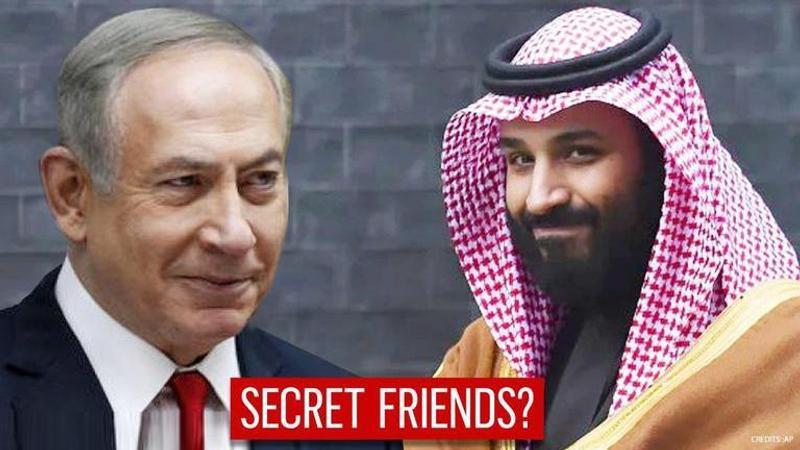Published 10:41 IST, November 24th 2020
Why Netanyahu's 'secret' meet with Saudi Crown Prince MBS is a warning call for Iran
After Saudi denied Netanyahu's visit, Israeli media continued fanning the flames, sharing a mountain of evidence for it. Here's what it could mean for Iran

In a first of its kind historic move, Israel Prime Minister Benjamin Netanyahu and his Mossad team allegedly flew to Saudi Arabia on Sunday, November 22, in secrecy to hold the first-known meet with the Kingdom's Crown Prince. Israeli and middle-eastern media buzzed with reports of Netanyahu travelling to Saudi, where he met with Crown Prince Mohammad bin Salman and US Secretary of State Mike Pompeo. Despite, Saudi Arabia rejecting Israeli reports of talks between the Crown Prince and the Israeli PM, there is a mountain of information of his visit to the Islamic State.
Netanyahu's secret trip to Saudi's Neom
Netanyahu, according to reports from The Times of Israel reached Neom, a smart city in the northwestern province of Saudi Arabia bordering Egypt, Israel and Jordan. Hebrew media reports also mentioned that he was accompanied by Mossad intelligence officers, in particular, its Chief of Staff Yossi Cohen. Although Saudi has categorically denied such a visit took place, Israel's Education Minister Yoav Gallant took to radio to congratulate Netanyahu on the 'amazing achievement'.
Gallant was reported to have said “The fact that the meeting took place and was made public — even if it was in only a semiofficial way — is something of great importance. Gallant further added while speaking to Army Radio that this move indicated the growing warm acceptance of Israel by the Sunni world and the prospects of normalising relations between nations. 'This is something our ancestors dreamed about,' he added.
US State Secretary Mike Pompeo who was part of the meeting tweeted later that the visit was constructive but made no mention of Netanyahu's presence there. However, he did mention that the meeting with the Crown Prince was fruitful and that both leaders discussed security and economic partnerships and the continued efforts to counter Iran's growing influence in the Gulf. The leaders also charted out a vision board of goals set for 2030 and additional moves to reform human rights issues in the region.
Why is Iran an issue for Saudi Arabia and Israel?
Israel Defence Forces have long combatted the threat of Iran's alleged terror proxies in the Middle East. Since the Iranian Revolution of 1979. the country has been accused of spreading "radical" ideology by establishing, funding and arming terror proxies across the Middle East region. Although this charge remains unproven, Israel, US and Saudi Arabia have on multiple occasions attested to this claim.
What is Iran's objective?
The establishment of a "land bridge" from Iran via Iraq, Syria and Lebanon, all the way up to Israel's border and the Mediterranean Sea. The ultimate goal as believed by Israel (which has remained under a state of Emergency since independence in 1948) is that Iran wants to see the destruction of the Jewish State. Incidentally, this was one of the goals of ISIS as well (Islamic State of Iraq and Syria) — to set up a unified Islamic State and see the fall of Israel.
Who are Iran's alleged proxies?
Saudi Arabia, the US and Israel claim that Iran has numerous terror proxies in the region, including but not limited to Hezbollah in Lebanon, Palestinian Islamic Jihad in the Gaza Strip, Shi'ite militias in Iraq and Syria, and the Houthis in Yemen. Another accusation levelled against Iran is that the Islamic Revolutionary Guard Corps (IRGC) — a branch of the Iranian Armed Forces, is responsible for external operations, training and managing these proxy outfits abroad. US Department of State published in their report via Foundation for Defense of Democracies that Iran spends upwards of $16 billion annually to support and arm terrorists and rogue regimes such as Assad's in Syria since 2012.
The alleged meeting comes in the backdrop of Trump administration's efforts to leave Israel with a parting gift — official State recognition and normalisation of relations. US' involvement in the process sped up the results and as now led to several countries signing the Abraham Accord to maintain peace and establish economic and cultural communication between these religiously and ethnically divided communities. Israel signed the Abraham Peace Accord with UAE on August 13, swiftly followed by a smattering of other smaller but formidable Islamic countries in the Middle East and Africa.
Updated 12:27 IST, November 24th 2020




